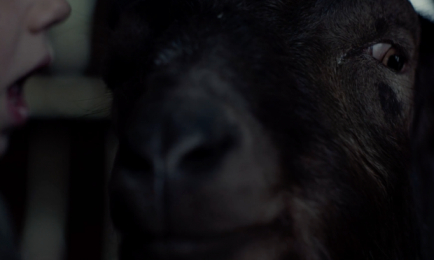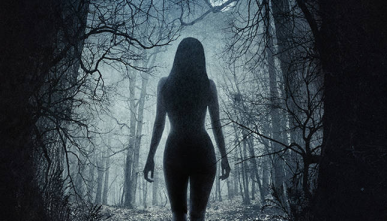We always like to go see the horror movies that create a critical buzz, because that’s a fairly rare event. So we were eager to see Robert Eggers’ debut feature, The Witch: A New England Folk-Tale. There’s a huge split on the Tomatometer, with critics giving it around 90% and audiences rating it in the 50s, but this is no deterrent: While it’s generally wrong to blame the audience for not liking movies, it’s a pretty good idea in the horror genre, where the audiences are, by-and-large, stupid.
Heh.
I’m only sort-of kidding, though. It may well be a localized stupidity, restricted to that showing in the theater, but a big part of the horror crowd is just there to be scared or, often enough, not to be scared, and to announce this to the audience. In other words, there’s a fair amount of social positioning in a horror movie.
It’s hard to imagine much dumber.

Please, Jesus, don’t let Loud-Scoffing-Guy be in this showing.
Anyway, this movie is not designed for the horror crowd, so I suppose a lot of the blame should go to the marketing department, since they’ll pitch it to dumb teenagers, and it’s more of an arty, spooky kind of film than a shock-fest, which is all the general audience generally wants. Though, interestingly perhaps, this genre of film used to be quite common back in the ’60s and ’70s: Lots of movies about witches, witch hunters, inquisitors, and general supernatural creepiness that are more atmospheric than shock-schlock, and really more history-with-horror-overtones than outright horror. (I think the costumes and settings must’ve been very cheap and accessible in England and Europe back in that bygone era.)
And so we come to The Witch, a lovingly crafted low-budget entry into the “Oh, crap, Satan is amongst us (or is he?)” genre that gets a lot of its steam from giving us a taste of the tenuous hold early settlers had on New England.
The story concerns a family whose patriarch (Ralph Ineson, “Game of the Thrones”, UK’s ” The Office”) has a religious quarrel with the town elders, insisting quite earnestly that they’ve all got the Bible wrong (he seems to have Calvinist-like views), and being thrown out by said elders. This is, more or less, how we got Rhode Island. One kind of fun thing about this movie is how much the various incidents hew to various historical incidents: Obviously, we’re not talking about Rhode Island in this movie, and I don’t think it’s derived from any single incident, but if you know anything about witch scares, you’ll find that Eggers has drawn heavily from known incidents to build his film.

Escaped from Westeros into Rhode Island.
And the reason it works—if you let it, because (like all horror) you do have to buy in—is that you can see how things that might be minor or even laughable today are a much bigger deal when you can’t just drive down to the Wal-Mart (or Whole Foods, if you prefer). Curdled milk nothing to get hysterical over? Well, that curdling means nobody gets milk that day. Mutant egg? Sort of funny and freaky when a dozen cost 69 cents, but not so much when it means a potential problem with the chickens.
We won’t even go into the whole “Your nubile daughter is being eyed by your pubescent son because, honestly, who else can he look at?” Times was hard. They were even harder if your religious principles required you to piss everyone else off.
Needless to say, our family does not fare well on their own. Besides a bunch of agricultural mishaps, nobody much wants to trade with them. So they can perhaps be forgiven when a sudden tragedy makes them look askance at their big, black, foul-tempered billy goat. As you might imagine, things escalate from there, with accusations being cast to and fro, and strange occurrences multiplying.

And the Lord saith: Location, location, location.
Two very positive things for me in this movie were: First, the occult incidents only ever happened when one person (or the twins) were around, giving the film two possible major ways to go, i.e., there’s a witch/it’s all hysteria; Second, the ending resolves the question unambiguously, rather than try for a dumb mysterious “or was it?” The ending itself felt very old school, almost hokey, but again, I liked it, and it was straight out of historical recordings.
I may have enjoyed the movie a bit more because I recently finished reading Extraordinary Delusions and the Madness of Crowds which had a big section on witch scares, but The Boy enjoyed it, I think, at least as much. It’s not gory, not shocky, not flashy—it’s really a spooky, atmospheric historical flick with some horror effects. (The third act and denouement are rather intense, though.)
We felt a lot of love went into this: For example, the characters all had English accents and spoke in a way that sounded appropriate. In fact, I was sure some of the dialog had been lifted from genuine testimony (Arthur Miller did that in spades for “The Crucible”, lifting entire trial scenes). In fact, I was so sure some of the dialogue had been lifted, I suspected that it probably wasn’t quite true to the time and place, but more likely collected from disparate places and times, enough to where a real specialist in the period would scoff. Obviously not going to be a problem for the average moviegoer—much less than just understanding what’s being said. But I’ll take missing words here and there over a casual modern patter, dude. (I did spot a set of breast implants, though! I’ll leave it as an exercise to the viewer as to where.)

Not on this perfectly innocent goat, of course.
The camerawork is very nice, too, and the lighting, which I understand was mostly natural. That doesn’t always work, in my opinion, but I liked it here. (I suspect some post-processing was done to color correct, of course.)
The acting is spot on, with Inerson being both the stern patriarch, loving father and concerned Christian. Kate Dickie (crazy eagle-lady from “Game of Thrones”, Prometheus) also does wonderfully as she tries to hang on to her sanity while her family (and life) falls apart. Harvey Scrimshaw was good as the elder son. And the twins were convincingly annoying. The angelic newcomer Anya Taylor-Joy (a model, I think) is perfectly cast as the girl trying to convince everyone she loves Jesus and isn’t a witch.
I guess that’s a big part of the “feeling the love”: When modern movies are made about deeply religious folk, especially pigheaded ones like the patriarch here, we’re invited to laugh and mock. But here you get the impression that Eggers has a vast amount of sympathy for his characters. He gets how hard life was and how fragile the systems to support it were. As a result, the audience feels for them, too, and really gets the sense of what it is to be in their shoes.
And that, my friends, is what going to the movies is about.

This lovely silhouette, suitable for clickbait, is from the poster, not the movie.

2 thoughts on “The Witch”